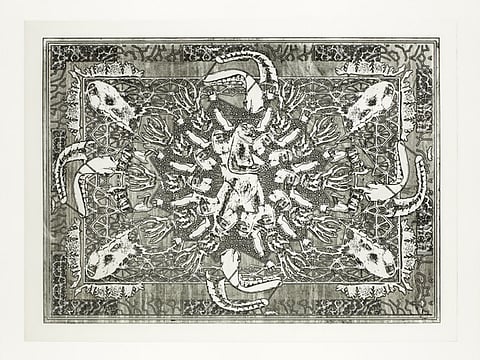Zhivago Duncan's art: Controlled chaos and disintegration
Zhivago Duncan’s new show presents works that deconstruct the core values of our society

Zhivago Duncan is of Syrian and Danish origin, has lived in many countries and speaks seven languages. Not surprisingly, as an artist he is interested in searching for his own identity and exploring the meaning and significance of origins. Duncan works with a variety of media, including painting, sculpture, photography, printmaking, performance art and large-scale installation, and he also likes to build and take apart machines.
In his latest exhibition in Dubai, “Never but Always”, Duncan has combined his diverse influences, experiences and interests to create artworks that reflect the current chaos in the world and deconstruct the core values and systems on which our society is built, to ask important questions. The artworks include etchings, etching plates and a series of paintings on raw linen.
Duncan’s compositions evoke a sense of controlled chaos and disintegration. Silkscreen prints of Islamic architecture and geometric patterns are blended with detailed deconstructions of machines such as cars and the guillotine, as well as popular icons such as Spiderman and Godzilla. The images are based on diagrams in his collection of build sheets from modelling kits.
Contrasting sharply with the earthy raw linen and the abstract patterns in the background are the brightly coloured hyper-realistic birds he has painted, which are based on natural history books. A touch of real gold adds to the visual appeal of the works. His choice of titles, such as “The Muscle of Self Reflection” and “Undisputed Reality”, adds to the narrative and offers keys to entering this carefully constructed world.
“Pop mythological characters such as Godzilla, Spiderman and King Kong are basically Western icons of subconscious popular morality. So, through these figures I am actually deconstructing the morality that they represent. I have superimposed these images on Islamic architecture and patterns, which represent the place where mathematics was born, and the beginning of an organised, ordered world that we have tried to create for ourselves. I used gold as a reference to the origin of values, the magic of alchemy and the foundation of civilisation.
“We are living in insane times right now and I am deconstructing moral pillars such as superstition, shame, right and wrong, love and hate, good and bad to understand why this is happening and where it originates from. I am raising questions about our society and our world, but I do not want to impose my questions on others. My goal is to create open narratives that provoke viewers to ask questions,” Duncan says.
He points out that the deconstructed car in “Over Stimulated Stimuli” is Ecto-1, the car from the movie “Ghostbusters”. “The car represents superstition, and I am trying to deconstruct the superstitions about ghosts, djinns and the supernatural. The frantic strokes in the background depict the over stimulated brain that gets lost in these irrational fears,” he says.
In “We Once Were”, he has deconstructed Batman and Robin, and painted birds that seem to be dead or just playing dead. “This work refers to our nostalgia for the past, and fear of the future which leads us to make irrational decisions such as supporting a leader who promises to make our country great again. But if we keep wanting to be how we once were we can never move forward,” Duncan says. In other works such as “Slipping over the line”, “One Pays Both Suffer” and “Undisputed Reality” he has examined the origin and consequences of war and terrorism.
The birds are an important motif in Duncan’s work. “Birds are often used on stamps and currency as a symbol of a country. But ironically they are migratory creatures who do not really belong anywhere. As an individual and an artist I identify with this breaking down of the notion of borders. Birds are important because they are the antithesis of the stability, belonging, permanence and identity they are supposed to represent. They remind me of the fact that as a species we are progressing, but we keep making more borders that divide us and cause great suffering,” he says.
“Never but Always” will run at Meem Gallery in Al Barsha until May 10.


